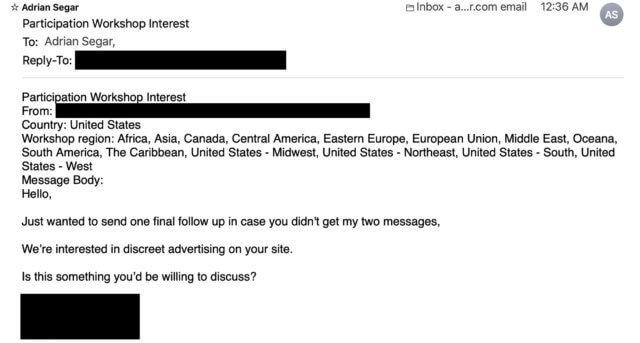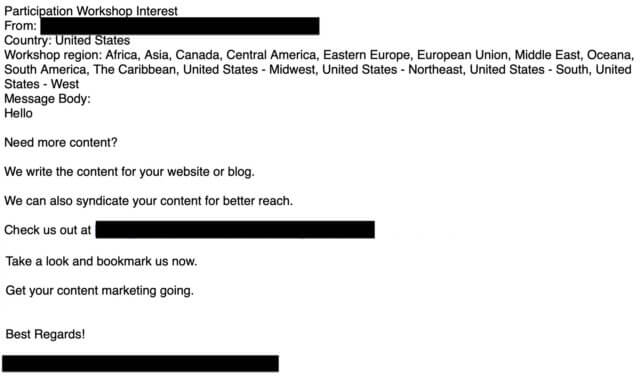Smart marketers avoid web form spam
Dear marketer, sending web form spam is a waste of your time! Here’s why.
Want to join my mailing list so you never miss another of my must-read blog posts? There’s a web form for that. Want to let me know about a cool peer conference/unconference you’re holding, so I can add it to my public calendar? There’s a form for that too. Want me to inform you when I hold a rare workshop? Would you be surprised to learn I’ve got you covered?
Web forms are the standard way for just about every website to communicate with visitors. So spammers use spambots and humans to create web form spam.
Why web form spam is a waste of marketers’ time
“Marketing” via web form spam is a waste of time because it’s easy these days to prevent just about all spambot-generated form spam by either using double opt-in or adding Google’s reCAPTCHA to your web forms.
Double opt-in
My mailing list receives enough traffic that I prefer to completely automate it. To ensure that spammers don’t fill it up with bogus email addresses, I use double opt-in. When someone fills out my signup form, they receive an opt-in confirmation email and have to click on the link to confirm. My list then adds them as a subscribed contact, as I know that the supplied email address is for a valid, monitored inbox. Spammers don’t respond to the confirmation email, so they don’t get added.
reCAPTCHA
Any website that uses forms can use reCAPTCHA, which is “free for up to 1 million assessments per month”. For the WordPress site you’re reading, it took me about ten minutes to sign up for and register an API key pair for my domain. A one-line change to each of my existing forms added reCAPTCHA to each of them.
I’m sure reCAPTCHA isn’t perfect, and it’s clear that spammers have been attempting to bypass it for a long time. However, I’m happy to leave the problem of fighting spambots to Google, and I don’t see any spambot spam on my site.
What I do still see is human-generated spam.
Why human-generated form spam is a waste of marketers’ time
Obviously, reCAPTCHA can’t stop human-generated spam because a human can successfully click through it in a way that bots can’t (it’s magic!) As a result, if some poor human somewhere really wants to spam me through a form they can.
And they do. Here are a couple of examples:
1) My peer conference calendar
I maintain a calendar of peer conferences/unconferences on this site for a couple of reasons. First, it’s a place where folks who are holding participant-driven events publicize them for free. And second, it’s an informative list that showcases the wide variety of a fraction of the unconferences that have been and are about to be held.
The reCAPTCHA on this form ensures that an actual person has to fill in the form to submit an event for inclusion. The form header reads: “Please note: This is not a calendar for conventional meetings. Don’t waste your time, or mine, submitting such meetings; they will not be listed.”
Regardless. every now and again a marketer types in a listing for a conference (usually a medical meeting) that is clearly a traditional event. I get an email with the information, and since I vet all entries before adding them to the calendar, their work goes into the trash.
A waste of everyone’s time.
2) My participation workshop form
I occasionally run workshops. Folks who are interested in attending one can sign up to be informed when I’m holding one in their region. Human spammers use this form in a pathetic attempt to reach me for things in which I have no interest.
For example, they use it to send me queries about accepting advertising…
…or content marketing services.
Bear in mind that somebody took the time to type (well, copy & paste) this into my form and pass the reCAPTCHA.
I delete such emails with a click.
Hey marketer, you’re wasting your time!
Conclusions
A few websites still allow people or bots to subscribe or post comments with no double opt-in or anti-spam measures. It’s easy to find them with their long lists of “make money from home” and worse spam on every post. Why they continue to allow this is beyond me, given the ease of preventing this kind of abuse. (I’m aware that moderating comments on a popular site is tough and human-resource expensive, even with services like Akismet, which I use to block an average of 25,000 spam comments per year from my site.)
From watching my web form spam over the years, it’s clear there are event marketing companies that are spamming their clients’ events to every event calendar on the web, whether the calendar is pertinent or not. I wonder if their clients know how ineffective this is.
Using the simple techniques I’ve outlined, it’s easy to make websites highly resistant to web form spam. Dear marketer, sending web form spam is a waste of your time. Smart marketers put their energy into more effective marketing approaches.



